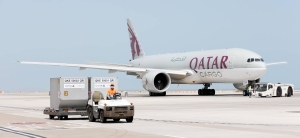Freedom of Information reveals unusual timing in the rejection of extra flights, linking it to a Doha Airport incident.
Questions have been raised in Australia after new documents released under Freedom of Information showed alleged coordination in two letters sent by the government about its controversial decision to reject a Qatar Airways request for extra flights, The Guardian reported.
The report said Australia’s foreign and trade authority was approached for advice on a letter drafted by the transport minister, which informed five Australian women who were in litigation against Qatar Airways about the airline’s unsuccessful bid for additional flights.
Transport Minister Catherine King was preparing a letter to inform the five Australian women, who were suing Qatar Airways, about the rejection while another letter was being simultaneously drafted to formally reject Qatar’s appeal for 28 additional weekly flights to major Australian cities.
The Department of Foreign Affairs and Trade (Dfat) played a significant role in advising on the two crucial letters, according to the FoI documents, suggesting a potential connection between the rejection and the troubling 2020 incident at Doha’s main airport.
The documents also reveal that the Australian government meticulously synchronised the timing of both letters when it officially declined the Gulf carrier’s request in July, a move that has drawn widespread criticism and shaken the country’s aviation industry.
The five Australian women who received the letter in July were strip searched and examined at Hamad International Airport in 2020 after the discovery of an abandoned newborn baby girl in a restroom at a terminal.
In 2021, Doha News learned that the security official responsible for ordering the invasive searches was charged a hefty fine and given a six-month prison sentence which he then appealed, but was upheld by the Qatari courts.
Investigations at the time found that the mother proceeded to board a flight after discarding the baby. Sources had told Doha News that the baby was taken to Qatar’s Orphans Care Center (Dreama), where authorities have ensured she is taken care of.
The Qatar government has issued an apology for the incident.
However, the women have have launched a case seeking damages from Qatar Airways and the Qatari government and actively lobbied Minister King to reject the airline’s flight expansion request.
Despite growing curiosity about the reasons behind the decision, both King and government ministers have remained tight-lipped, citing “national interest” as the primary factor behind the rejection.
Although she initially downplayed the significance of the Doha airport incident, King later acknowledged its role as contextual background for her decision. Meanwhile, questions have also arisen regarding the influence of Qantas, which reportedly lobbied against granting Qatar Airways additional flights.
While the specifics of the advice given by Dfat officials remain redacted due to concerns over international relations, it is evident that Dfat was aware of the letter King intended to send to the five Australian women through their legal representatives at Marque Lawyers.
This acknoweldgement coincided with the drafting of the official rejection letter for Qatar Airways by the transport department.
The Senate inquiry, which has been examining the rejection of Qatar Airways’ request, heard evidence indicating that King had been briefed on the matter as early as January but delayed making a decision until July.
Qatar Airways officials reported receiving the official rejection via the Qatar Civil Aviation Authority on 14 July, after they found out about the decision via the media.
King’s letter to the five women, informing them that no additional air rights for Qatar Airways were under consideration, was dated 10 July but sent to Marque Lawyers on 17 July, as suggested by the FoI documents. This timing aligns with Dfat’s consultation regarding the official rejection letter, The Guardian reported.
An email exchange between Dfat and the transport department revealed an official inquiry into the dispatch of King’s letter to Marque Lawyers.
On 14 July, a bureaucrat from Dfat’s Middle East, Africa and Afghanistan division sent a transport department official an email chain in which Dfat advised “some very minor changes” to the draft of the official rejection letter that was due to be sent to Qatari officials.
“If you also know when the King reply letter to Marque goes out, appreciate you letting us know,” the email added.
Following Dfat’s advice on the official rejection letter, it was promptly sent to Qatari officials, while King’s letter to the women was still pending. Three days later, Dfat inquired about the status of King’s letter, indicating a high level of coordination in these communications.
Last week, in response to calls for her appearance before a Senate inquiry scrutinising her rejection of Qatar Airways’ request, Transport Minister King dismissed it as a “political stunt”.
The Senate committee was launched in response to growing discontent within the aviation and tourism industries regarding the Albanese government’s refusal to grant Qatar Airways’ request to nearly double its flights to major Australian cities.
Committee chair Bridget McKenzie has called for both King and Joyce to testify before the inquiry.
The Senate committee, after two weeks of hearings with stakeholders and government departments, is expected to deliver a report on the country’s bilateral air rights this week.
Qatar Airways executives expressed “surprised and shocked” by the decision to “unfairly” reject their expansion bid into Australia, especially since no specific reasons were provided for the rejection.
“Even more surprising was that the government gave us no reason for rejecting our application,” the airline’s senior vice-president of global sales, Matt Raos, told the committee.







